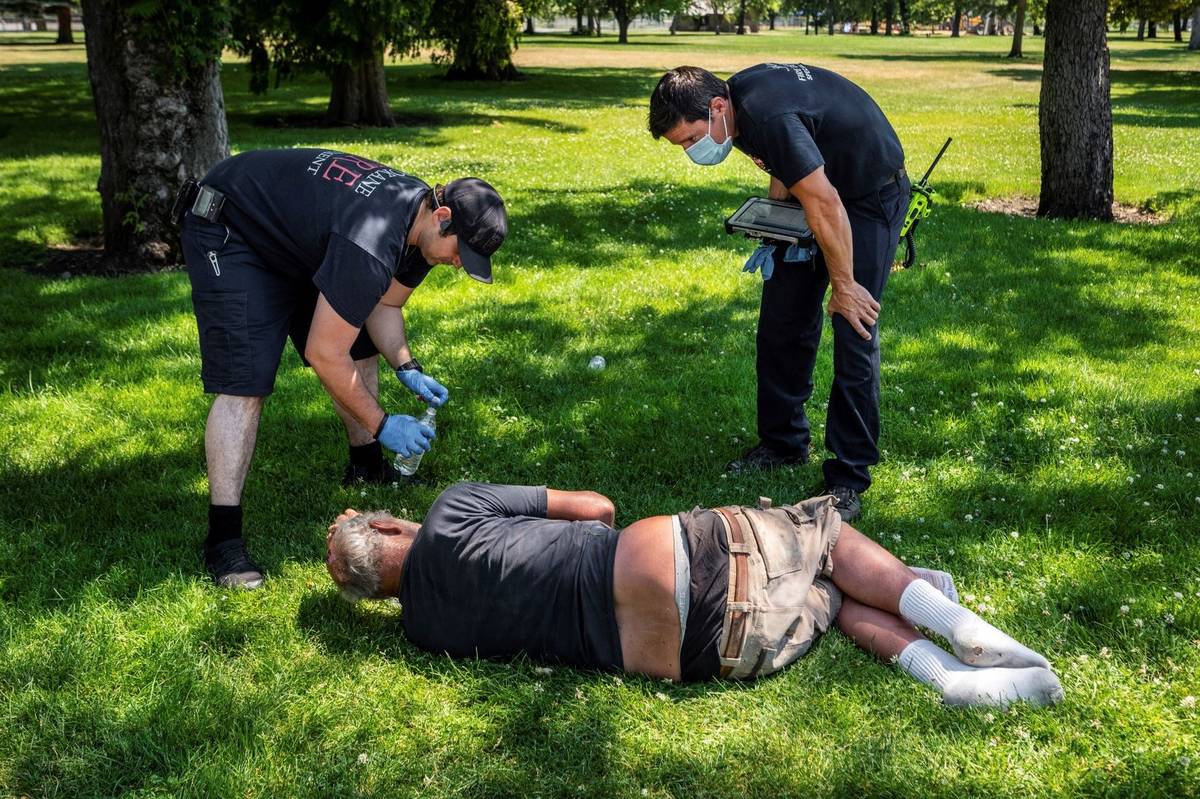Northwest heat wave may be blamed for hundreds of deaths
SALEM, Ore. — The grim toll of the historic heat wave in the Pacific Northwest became more apparent as authorities in Canada, Washington state and Oregon said Wednesday that they were investigating hundreds of deaths likely caused by scorching temperatures that shattered all-time records.
British Columbia’s chief coroner, Lisa Lapointe, said her office received reports of at least 486 “sudden and unexpected deaths” between Friday and Wednesday. Normally, she said about 165 people would die in the Canadian province over a five-day period.
“While it is too early to say with certainty how many of these deaths are heat related, it is believed likely that the significant increase in deaths reported is attributable to the extreme weather,” LaPointe said in a statement.
Many homes in Vancouver, much like Seattle, don’t have air conditioning, leaving people ill-prepared for soaring temperatures.
“Vancouver has never experienced heat like this, and sadly dozens of people are dying because of it,” Vancouver police Sgt. Steve Addison said in a statement.
Oregon health officials said more than 60 deaths have been tied to the heat, with the state’s largest county, Multnomah, blaming the weather for 45 deaths since temperatures spiked Friday. At least 20 deaths in Washington state have been linked to the heat, a number that was expected to rise.
The heat wave was caused by what meteorologists described as a dome of high pressure over the Northwest and worsened by human-caused climate change, which is making such extreme weather events more likely and more intense. Seattle, Portland and many other cities broke all-time heat records, with temperatures in some places reaching above 115 degrees Fahrenheit (46 Celsius).
Heat wave moves east
While the temperatures had cooled considerably in western Washington, Oregon and British Columbia by Wednesday, interior regions were still sweating through triple-digit temperatures as the weather system moved east into the intermountain West and the Plains.
Amid the dangerous heat and drought gripping the American West, crews were closely monitoring wildfires that can explode in the extreme weather.
Heat warnings were in place for parts of Washington, Oregon, Idaho and Montana as well as Saskatchewan and southern Alberta, where “a prolonged, dangerous, and historic heat wave will persist through this week,” Environment Canada said.
“The temperatures recorded this week are unprecedented — lives have been lost and the risk of wildfires is at a dangerously high level,” Canadian Prime Minister Justin Trudeau said.
In Oregon, the Multnomah County medical examiner blamed 45 heat deaths on hyperthermia, an abnormally high body temperature caused by a failure of the body to deal with heat. The victims ranged in age from 44 to 97.
The county that includes Portland said that between 2017 and 2019, there were only 12 hyperthermia deaths in all of Oregon.
“This was a true health crisis that has underscored how deadly an extreme heat wave can be, especially to otherwise vulnerable people,’’ Dr. Jennifer Vines, the county’s health officer, said in a statement.
The King County medical examiner’s office, which covers an area including Seattle, said on Wednesday that a total of 13 people had died from heat-related causes. In neighboring Snohomish County, three men — ages 51, 75 and 77 — died after experiencing heatstroke in their homes, the medical examiner’s office told the Daily Herald in Everett, Washington, on Tuesday. Four deaths have also been linked to heat in Kitsap County, west of Seattle.
Deaths, rolling blackouts in Spokane
In western Washington, the Spokane Fire Department found two people dead in an apartment building Wednesday who had been suffering symptoms of heat-related stress, TV station KREM reported.
The heat led a power company in Spokane to impose rolling blackouts because of the strain on the electrical grid. Avista Utilities says it’s trying to limit outages to one hour per customer.
Heather Rosentrater, an Avista vice president for energy delivery, said the outages were a distribution problem and did not stem from a lack of electricity in the system.
Renee Swecker, 66, of Clayton, Washington, visited a splashpad fountain in downtown Spokane’s Riverfront Park with her grandchildren Wednesday, saying they “are going everywhere where there is water.”
“I’m praying for rain every day,” Swecker said.


















